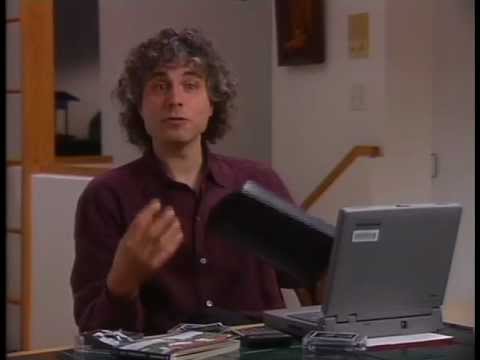Christopher Sykes
From the BBC TV series ‘Seven Wonders of the World’ (1995). Steven Pinker (b. 1954) is a Canadian-born experimental psychologist, cognitive scientist, linguist and popular science author. He is now a professor in the Department of Psychology at Harvard University and is best known for his advocacy of evolutionary psychology and the computational theory of mind. He is the author of six books for a general audience: The Language Instinct (1994), How the Mind Works (1997), Words and Rules (2000), The Blank Slate (2002), The Stuff of Thought (2007), and The Better Angels of Our Nature (2011).
Source
STEVEN PINKER: Seven Wonders of the World



Consciousness is a mystery our mind is too limited to grasp, Pinker claims. This seems to conflict a bit with his view of language and thoughts (with their capacity for metaphorical abstract use) as being combinatorial systems, capable of creating unlimited amounts of different meanings. Surely we'll be able to graps it at SOME level. He may go wrong in framing it to be a special kind of object. It's not an object, it has to do with the recurrent representational capacity of the mind.
No matter what decade he is speaking from, Steven Pinker is always brilliant and fascinating.
He argues that the CAPACITY for language is built-in, not language itself.
Fantastic video, Pinker continues to amaze me.
Pinker redeems the Jewish people.
But what could ever possibly redeem you for making such a despicable comment?
I hate when someone says a problem is insoluble because they can't personally solve it. People said that about why atoms interact the way they do, they said it about where species come from, they even said it about weather atoms exist. Consciousness is as likely to be solved as all the rest. With the power of math and abstract thought we can understand infinity – how could we not understand consciousness? We already know the general answer to why it's here – it must increase fitness value.
This guy probably got all sorts of academic pussy
You don't understand combinatiorial systems. For example, using digits you can form an inifite amount of different numbers, but however you arrange them, you can never form a word.
It is an absolute shame that this doesn't have more views.
I have now watched dozens of hours of Pinker lectures, interviews, et cetera, and this one captures perfectly his diverse range of interests. This was insightful, interesting, and entertaining. If you think otherwise, I think "big brother" is on- go watch it. To fellow viewers: thank you for watching this; if we keep up the demand for quality entertainment such as this, the supply will be sure to eventually reflect it.
but… what does the fox say?
If anyone ever finds where the footage of the robot having his face removed comes from (during the consciousness segment), please tell me.
Round-off error in the powers of 8 at 6:46.
2:34 The bicycle
5:39 Combinatorial systems
10:00 The language instinct
18:05 The camera
20:41 The eye
22:07 Stereo vision
25:58 The mystery of consciousness
The times mark the beginning of the title screens. Each title screen is preceded by an introduction to the subject.
The "dis it appear" story was fascinating. One related thing that puzzles me in the way that people go the other way, making language pronunciations and grammar LESS regular. Why do people make up special non-phonetic, non-logical, ad hoc pronunciation for words and grammar? To my ear, they are not any easier to pronounce.
Pinker is an unusual famous person. He wrote back promptly on two different occasions when I wrote him.
Good points, Mr. Pinker. Even though it doesn't change the point, there are only 7 notes in music (not counting the alterations).
Excellent. Very deep questions right at the end !, .. also, I've also pondered that question about whether the lobster feels any pain when dropped into a pan of boiling water.
I love Pinker's approach to questions and above all his communicative skill.
ass
I remember hearing a 5 year old child say "Yesterday, I brung my toys to the basement." It was interesting to me because 'brung' isn't a word adults use, but he understood that a song performed in the past was 'sung', a picture was hung on the wall, and so on, so therefore, he must have reasoned, brung was the past tense of bring. Totally reasonable, but owing to the weirdness that is grammar, he was corrected and, sure enough, he very quickly adopted the new word; 'brought'. So his reasoning was almost as amazing as his flexibility to absorb a brand new, counter-intuitive word.
I love how Pinker looks at the world. Its a pleasure to see through his eye, albeit briefly and imperfectly. He is a delight.
Music is infinite but not in the way described here. Music, like any expression of consciousness, needs memorable aspects and salient variety. Generally speaking, recursive structures similar to those used in language are used to create these aspects. Without them you pretty much just have noise. My theory is that this sort of sneaking up on infinity is largely what makes music inherently (cross-culturally) attractive.
Infants subjected to unanesthetized circumcision are traumatized by the experience. We now know that infants and children feel pain more intensely than adults. Yet the practice of unmedicated circumcision continues.
I'll bet the worm is pretty uncomfortable too.
Is language an evolutionary invention of our consciousness? it would seem so. We create word representations of what we see, hear, feel, etc., and Pinker's most interesting comment is that "language" does not describe all of our reality! Are those realities we have not deigned to describe in words real or important?
Let me know it if you came to watch this! This is a great video.
Oh, here's your egg:
ooo OOO ooo
oOO OOo
oOO OOo
oOO OOo
oOO OOo
oOO OOo
oOO OOo
oOO OOo
oOO OOo
oOO OOo
oOO OOo
oOO OOo
oOO OOo
oOO OOo
oOO OOo
oOO OOo
oOO OOo
oOO OOo
oOO OOo
oOO OOo
ooo OOO ooo
steve pinker gives my brain a boner
It's hard to think that his ideas were controversial then, they are pretty much mainstream now.
Pinker is the total package and that's from a females point.
I've heard "behave" get reformed into "since I was being very have"
I always get a little frustrated when I hear statements like "40 different times natural selection seemed to be going out of it's way to solve the problem of how to get a representation of reality from the light that sprays off objects." Where was problem solving involved? It's not like all the animals were deliberating to themselves "Now what are we going to do with all this useful light?!"
Steven pinker as a scientist and linguist managed to build a new thaught inside my brain and enlight my way into a higher educational path,all this was due to his worthful lectures i have been watching the last three months ago.
Pinker is without a doubt one of my favorite thinkers of all time. Such clarity of thought and expression – always a joy to listen to.
Shouldn't that be seven notes? Unless he is talking specifically about those 8 pitches, which seems like an undesirable limitation.
What are those birds at 16:00
Pinker is brilliant. I'm jealous of his brain.